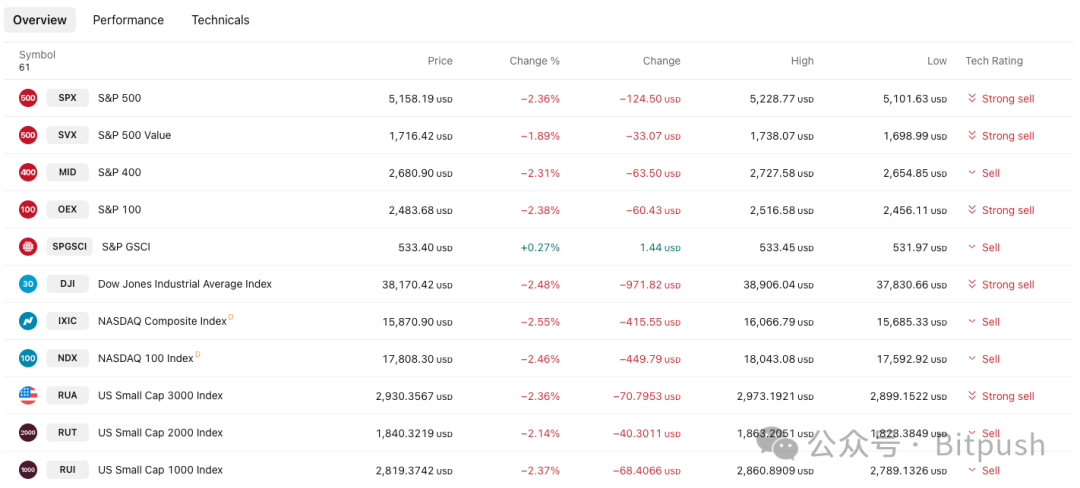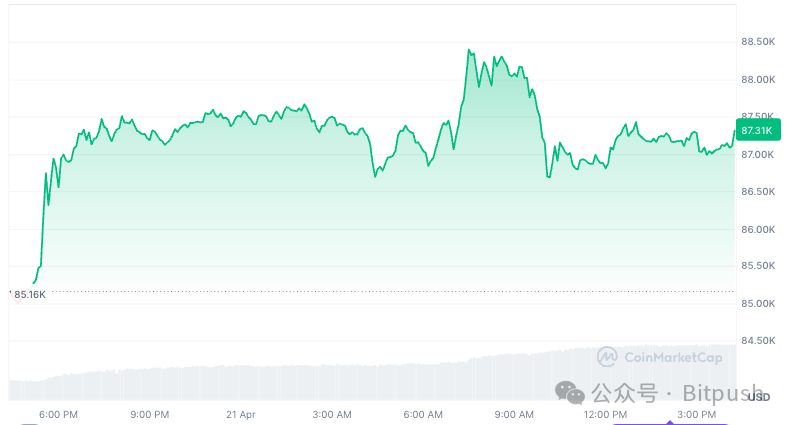Trump "speaks", US stocks "scared" and global capital began to collectively "abandon the United States"

Reprinted from panewslab
04/22/2025·1MAuthor: BitpushNews Mary Liu
The wave of "selling American assets" is ongoing as markets worry that U.S. President Donald Trump may fulfill his threat to fire Fed Chairman Jerome Powell and implement policies that lead to a recession.
Data shows that the S&P 500 fell 2.7% on Monday to 5142.18 points, down 13% from the beginning of the year and 16% from the recent highs; the Dow Jones Industrial Average fell 972 points, down 2.5%; the Nasdaq Composite Index fell into a bear market area, down 21% from its peak.
The bond market is also not optimistic, with 10-year U.S. Treasury yields rising 7 basis points to 4.41%, and 30-year yields jumped 10 basis points to 4.91%. In the foreign exchange market, the US dollar index fell 0.9%, depreciating by more than 5% against the euro and yen, hitting a three-year low.

Investors are struggling to cope with the risk of Powell's possible discharge (the White House said last week was evaluating the matter), and the potential impact of Trump's policy on the world's largest economy, evacuating U.S. safe-haven assets, coupled with broader risk aversion sentiment, pushing gold to an all-time high on Monday, and cryptocurrencies also rose, with Bitcoin hitting $88,000 for the first time since March.

Recession + Fed independence concerns = worsening
"As the current government has injected increasingly high levels of uncertainty into the economic outlook, any attempt to remove Powell will exacerbate downward pressure on U.S. assets," said Ian Lyngen, head of U.S. interest rate strategy at BMO Capital Markets.
Trump once again called for the Fed to cut interest rates through Truth Social on Monday, writing: "Many people call for a 'pre-emptive rate cut'."
Although legal scholars say it is difficult for Trump to fire the Fed chairman easily, and Powell has said that he will not resign if Trump requests, relevant speculation still brings new blows to U.S. assets. Washington's radical trade tariffs have sparked concerns about the U.S. recession and have heightened questions about U.S. Treasury bonds' status as a safe-haven asset for the first choice.
Multiple risks are exacerbating market concerns about economic growth and inflation paths—and how the Fed balances both. While traders expect the Fed to cut interest rates at least three times this year, former New York Fed Chairman Bill Dudley wrote in a Bloomberg Opinion column that policymakers may move more slowly than expected.
The Bloomberg dollar spot index fell 1% on Monday, falling to its lowest level since the end of 2023, before the decline narrowed slightly. The yen rose to its highest level since September last year, while the euro soared to its highest point in more than three years.
The euro is currently trading around $1.15, close to strategists' most optimistic end-of-year forecasts. Bloomberg data shows that the yen exchange rate against the US dollar is about 140.50, stronger than the median forecast of 143 at the end of the year.
"Trump's remarks about the possible firing of Fed Chairman Powell, even if these ideas do not become a reality, also pose a major threat to the Fed's independence, which in turn threatens the dollar's status as a safe-haven currency," said Helen Given, a Monex forex trader.
"If the U.S. economy falls into a recession and the central bank cannot or cannot act independently, this recession may intensify and bring more concerns to the market," she added.
Traders in options markets have been bearish on the dollar to the highest level since the Covid outbreak. The premium paid to hedge against the risk of a decline in the US dollar against a basket of currencies in the coming year (relative to positions that bet on the rise) has reached its highest level since March 2020.
Monday's sell-off came after National Economic Commission Director Kevin Hassett said Friday that Trump was studying the matter. According to a trader in the matter, several hedge funds joined the ranks of selling the dollar on Monday after Hasset's remarks. The traders requested anonymity because they did not have the right to speak publicly about the matter.
Hedge funds bullish sentiment on the dollar has fallen to its lowest level since October last year, a summary of data from the Commodity Futures Trading Commission. While headlines about Powell do not help market sentiment, others say the deteriorating global trade war may continue to be the dominant factor in dollar trading.
"Central bank independence is so precious - it's not something to take for granted, and once it's lost, it's hard to win again," said Will Compernolle, macro strategist at FHN Financial in Chicago. Trump "The threat to Powell does not help foreign investors' confidence in U.S. assets, but I still think tariff news is the main driver," he said.
The additional yield required by investors to hold 30-year Treasury bonds instead of two-year Treasury bonds has risen for nine consecutive weeks, the second time since Bloomberg began compiling the data in 1992. In early Monday trading, strong front-end demand was further driven by the steepening trend of the yield curve through bulk trading in two-year futures.
Short US dollars, long gold, Bitcoin
Warnings from Wall Street stock strategists continue to rise as Trump's trade war weakens U.S. economic growth and profit prospects.
Citigroup strategists cut their views on U.S. stocks last week, saying the cracks of "American exceptionalism" will continue. They have joined the ranks of the recent bearishness of US stocks by institutions such as Bank of America and BlackRock.
"The latest catalyst for the dollar sell-off may be pressure on Powell, but the reality is that the dollar sell-off no longer needs more reasons," said Gareth Berry, a strategist at Macquarie in Singapore. "What has happened in the past three months has provided enough reason for a continued dollar sell-off that could last for months."
Meanwhile, Lawrence McDonald, former U.S. macro strategy director at Industrial Bank, said that it may be time to sell gold and buy Bitcoin.
He commented on X: "Bitcoin has never performed so well with the volatility index (VIX) approaching 30. This is a strong signal (good news) that the Bitcoin market is maturing and a strong proof of the huge pressure on fiat currencies such as the US dollar."

